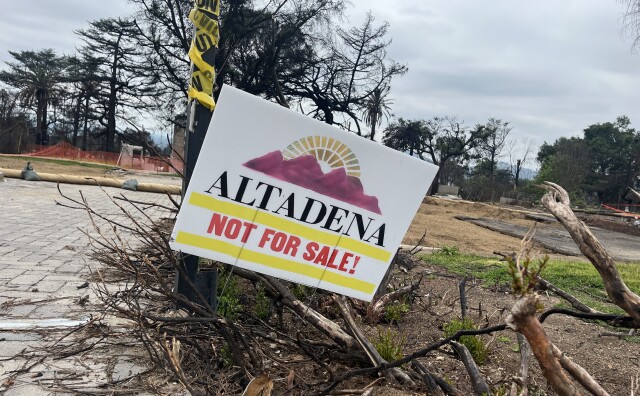With our free press under threat and federal funding for public media gone, your support matters more than ever. Help keep the LAist newsroom strong, become a monthly member or increase your support today.
Pianist Lara Downes heals loss with 'Love At Last'

As she reflected on the death and destruction that permeated the headlines in late 2022 — the war in Ukraine, Uganda's Ebola outbreak and gun violence in the U.S. — pianist Lara Downes cast light on that darkness by uniting the voices of composers from today and centuries past.
She found a sense of purpose to heal and bring hope after loss, trauma or tragedy. It's what defines her new album, Love at Last, which offers 24 works by composers from around the world.
"The main impetus was my awareness that when we kept talking about unprecedented times that that wasn't true, that everything we were experiencing was precedented, and this music was illustrating that," she tells NPR's Michel Martin, referring to the isolation of the pandemic.
The oldest piece on the album is based on the 18th century composer Johann Sebastian Bach's cantata "Sleepers Awake," itself inspired by a hymn composed more than 100 years earlier by a pastor of a small German town swept up in a plague epidemic. Downes plays an arrangement by Polish pianist Ignaz Friedman, who sought his own form of solace as he fled the spread of Nazism in Europe.
"It was really clear to me that I could take this music and show cycles of history," Downes says, "the ins and outs of tragedy and chaos and the possibility always for new beginnings."
Other featured composers wrote their pieces during the social distancing and isolation measures triggered by our current pandemic. Calliope Tsoupaki, of Greece, says she penned Meeting Point to show that "there is no distance between us when it comes to music, when it comes to love."
In works like "Dawn" by Jaroslav Ježek, Downes delves into what she calls "inherited meaning." During the Nazi occupation of Prague, this tune played on the radio each morning as a message of resistance and hope. When she performed it at the Czech Embassy in Washington, D.C. a few years ago, Downes found most of her audience in tears. "Everyone in that room had experience of that piece handed down through their parents or grandparents," Downes recalls. "This idea that music travels and carries with it its own time and then translates that into ours, that to me is just so incredibly powerful and beautiful."
Afghan composer Milad Yousufi — who's also a poet, singer, painter and calligrapher — has personal experience of turning to music in difficult times. He was born during the civil war in Afghanistan. The Taliban rulers had banned music, so a young Yousufi painted piano keys on paper and pretended to play while imagining what the notes might sound like. On the album, Downes performs Healer, his 2020 commission from the Refugee Orchestra Project.
"Music is able to do that. You pour your grief, all your emotions into music to create something beautiful," Downes says. "And to harness all this beauty into this one album, it's really just a testament I think to the hope and the growth that comes out of times like these."
The album's title comes from a poem by Shaul Tchernichovsky, written in Odessa in 1894, shortly before the anti-Semitic violence in his native Ukraine, the Russian revolution and two world wars that he witnessed until his death in Jerusalem in 1943.
The poem concludes: "Let the time be dark with hatred / I believe in years beyond / Love at last shall bind all peoples / In an everlasting bond."
Copyright 2023 NPR. To see more, visit https://www.npr.org. 9(MDA1OTI3MjQ5MDEyODUwMTE2MzM1YzNmZA004))
At LAist, we believe in journalism without censorship and the right of a free press to speak truth to those in power. Our hard-hitting watchdog reporting on local government, climate, and the ongoing housing and homelessness crisis is trustworthy, independent and freely accessible to everyone thanks to the support of readers like you.
But the game has changed: Congress voted to eliminate funding for public media across the country. Here at LAist that means a loss of $1.7 million in our budget every year. We want to assure you that despite growing threats to free press and free speech, LAist will remain a voice you know and trust. Speaking frankly, the amount of reader support we receive will help determine how strong of a newsroom we are going forward to cover the important news in our community.
We’re asking you to stand up for independent reporting that will not be silenced. With more individuals like you supporting this public service, we can continue to provide essential coverage for Southern Californians that you can’t find anywhere else. Become a monthly member today to help sustain this mission.
Thank you for your generous support and belief in the value of independent news.

-
The Palisades Fire erupted on Jan. 7 and went on to kill 12 people and destroy more than 6,800 homes and buildings.
-
People moving to Los Angeles are regularly baffled by the region’s refrigerator-less apartments. They’ll soon be a thing of the past.
-
Experts say students shouldn't readily forgo federal aid. But a California-only program may be a good alternative in some cases.
-
Distrito Catorce’s Guillermo Piñon says the team no longer reflects his community. A new mural will honor local leaders instead.
-
The program is for customers in communities that may not be able to afford turf removal or water-saving upgrades.
-
More than half of sales through September have been to corporate developers. Grassroots community efforts continue to work to combat the trend.







